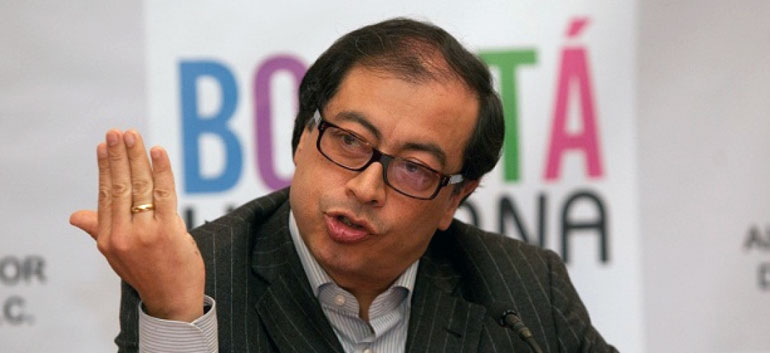Colombia’s most notorious mayor is beginning to show increasing signs of pessimism, as his endless attempts to reach out to both national and international justice against his shock dismissal last December have been slapped down perhaps one too many times.
It would seem that more than two and a half months of battling Colombia’s Inspector General’s Office unwavering resolution to kick him out as head of Bogota Town Hall and ban him from office for 15 years as a result of his failed reform of the capital’s waste collection service, has left Gustavo Petro on his last legs.
MORE: Why Colombia’s State Council Shut The Door For Bogota’s Mayor
A day after Colombia’s State Council rejected an appeal that would have suspended Petro’s dismissal process, the mayor tweeted on Thursday that the chances of him leaving office in the next few days was all too likely.
“At the speed with which the Inspector General’s friends are moving in the justice system, we’ll see the substitution of Bogota’s elected government this coming week,” Petro tweeted.
The mayor’s unmasked loss of faith in the judicial system led him to tweet on Wednesday that the only hope he and his supporters had was for the “the people themselves [to] rise up.”
For some time an appeal to the IACHR — which as the power to demand precautionary measures should It rule in favour of Petro — looked like it could be the mayor’s sturdiest safety net.
MORE: Petro vs. Colombia — can international bodies save Bogota’s mayor?
This option too, however, seems to be dwindling in the mind of the mayor. When asked during an event in Bogota on Thursday as to whether he believed the IACHR would step up in his defense, Petro responded:
“I haven’t got the slightest idea.”
What was certain to Petro, however, was that he would not still be holding Colombia’s second highest office come 2016. The time in office for which the mayor had been elected was from 2012 to 2016.
Though beat, the mayor’s words still reflect the value for democracy that has always been at the crux of his defense.
“Starting from December 31, 2015, I will effectively no longer be in [Bogota’s] town hall,” Petro said. “I would disregard the idea of [vice presidential candidate German Vargas Lleras’] prolonging one’s time in office or extending a term for which I was not elected,” Petro said of President Juan Manuel Santos’ recent announcement that he plans to extend mayors’ terms to five or six years.
MORE: Santos calls for longer political terms and no reelections
Since December, Petro has certainly had minor wins, including the temporary suspension of his dismissal by an administrative court, his highest approval ratings yet and the IACHR’s decision to study his appeal.
MORE: From Mayor to Martyr: Gustavo Petro’s unexpected rise
January also saw the withdrawal of criminal charges against him regarding the 2012 scandal that left trash uncollected in the capital’s streets for three days as the mayor attempted to bring collection services under government control.
MORE: Dismissed Bogota mayor did not break the law: Report
Nonetheless, the tide against him may be stronger. Appeals in his defense have been turned down by a number of Colombian institutions and most recently by the State Council.
The rejection by this high court was one of the heaviest blows to Petro so far, turning down the proposal by a State Council magistrate to put the dismissal process on hold until the council had had time to revise the case in depth.
Petro’s most recent words contrast starkly to those of the man who, immediately following the announcement by Inspector General Alejandro Ordonez last December 9, “democratic and peaceful revolution” against what he defined to be a “coup” by the IG.
MORE: ‘This is Colombia’s Tahir square’: Dumped Bogota mayor calls for ‘peaceful revolution’
The same man who rallied up thousands of followers in Bogota’s main square and travelled thousands of miles to appeal his case to the Inter-American Commission of Human Rights (IACHR), but who has increasingly begun to fall apart at the seams.
MORE: ‘This story has finished:’ Bogota mayor expects to leave office Jan 30
Today, Petro and Bogota lie in wait of the verdict of Colombia’s Supreme Judiciary Council regarding the hundreds of writs of protection – documents that can be filed by any citizen in protection of fundamental rights and which must be seen to by a judge within 10 days – that aim to keep him in power.
There is also the question of whether Colombia’s Constitutional Court – which is the country’s final court of appeal – will uphold or nullify any rulings made by the judiciary council. The court also has the power to counteract the State Council’s decision regarding Wednesday’s rejected appeal.
Sources
- La próxima semana tendríamos sustitución del gobierno de Bogotá: Petro (Caracol Radio)
- Estas son las posibilidades luego del fallo del Consejo de Estado (Caracol Radio)
- Consejo Superior de Judicatura, a definir el futuro de Petro (Noticias RCN)


